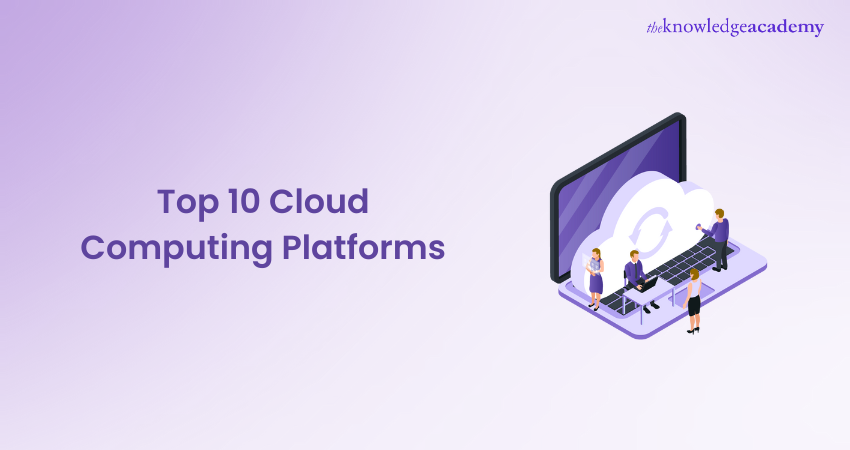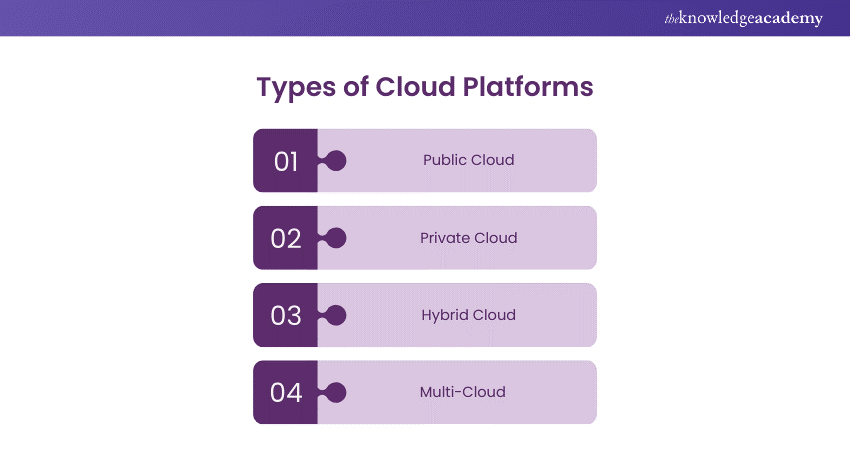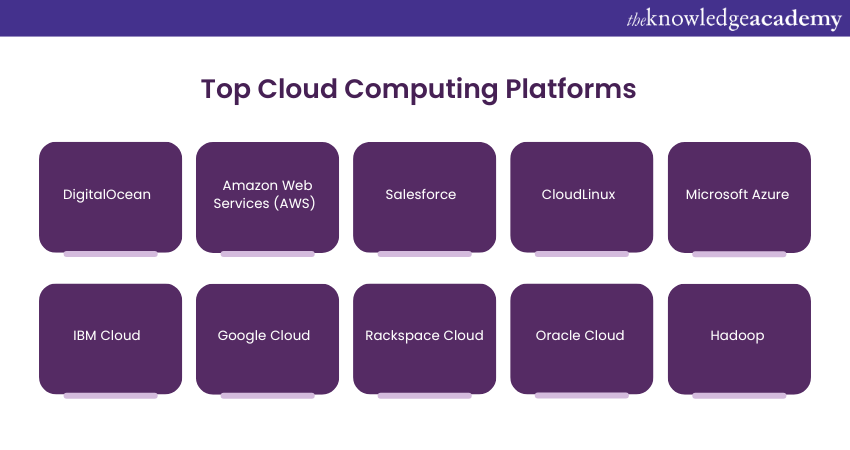We may not have the course you’re looking for. If you enquire or give us a call on 01344203999 and speak to our training experts, we may still be able to help with your training requirements.
Training Outcomes Within Your Budget!
We ensure quality, budget-alignment, and timely delivery by our expert instructors.

Cloud Platforms have revolutionised how we use technology, providing immense power and storage capabilities over the internet. In this blog, we discuss the top Cloud Computing Platforms, including popular names like AWS, Microsoft Azure, and Google Cloud.These digital powerhouses are like the backstage crew of the internet, quietly enabling everything from streaming cat videos to running complex business applications.
Whether you're a small business or a large enterprise, understanding these platforms can help you make informed decisions. Dive in to discover how these Cloud Computing Platforms can transform your business and meet your unique needs.
Table of Contents
1) What is a Cloud Platform?
2) Types of Cloud Platforms
a) Public Cloud
b) Private Cloud
c) Hybrid Cloud
d) Multi-Cloud
3) Top Cloud Computing Platforms
4) Conclusion
What is a Cloud Platform?
A Cloud Platform is a service that provides computing power and storage over the internet. Instead of using local servers or personal computers to run applications or store data, businesses and individuals can use Cloud Platforms to access these resources remotely. This allows for greater adaptability, growth potential, and cost efficiency.
Here are some key points about Cloud Platforms:
a) Access from Anywhere: You can access your data and applications from any device with an internet connection.
b) Scalability: Easily increase or decrease your computing resources based on your needs.
c) Cost-efficiency: Pay only for the resources you use, reducing the need for expensive hardware investments.
d) Maintenance-free: The cloud provider manages and maintains the infrastructure, so you don't have to worry about technical issues.
Types of Cloud Platforms
Cloud Platforms come in various forms, each offering unique benefits and use cases. Understanding the different types can help you choose the best solution for your needs. Let's explore:

Public Cloud
A public cloud is a type of Cloud Computing service where resources are provided over the internet by third-party providers. These resources, like storage and computing power, are shared among multiple users, making it cost-effective. Public clouds are easy to scale and offer a wide range of services. However, they might have lower security and privacy compared to private clouds.
Private Cloud
A Private Cloud is a dedicated cloud environment used exclusively by one organisation. It offers enhanced security and privacy since the resources are not shared with others. Private clouds can be hosted on-site or by a third-party provider. They provide greater control over data and applications, but they can be more expensive and require more management than public clouds.
Hybrid Cloud
A hybrid cloud combines both public and private clouds to create a flexible and balanced computing environment. Organisations can use the private cloud for sensitive data and critical applications while taking advantage of the public cloud for less sensitive tasks and additional resources. This approach offers the best of both worlds, providing flexibility, cost-efficiency, and enhanced security.
Multi-cloud
A multi-cloud strategy involves using multiple cloud services from different providers simultaneously. This approach helps organisations avoid dependency on a single provider and allows them to choose the best services for their needs. Multi-cloud environments can improve performance, reliability, and cost management. However, they require careful management and integration to ensure seamless operation across different platforms.
Acquire the skills for easy troubleshooting with our Microservices Architecture Training – Join today!
Top Cloud Computing Platforms
Now, let's delve into the top Cloud Computing Platforms that have made a significant impact on the industry:Image Description: Explaining the top Cloud Computing Platforms

1) DigitalOcean
DigitalOcean, headquartered in New York City, was founded in 2011. It is a Cloud Platform known for its simplicity and user-friendliness. It allows developers to quickly deploy and manage applications. The platform is cost-effective and offers scalable solutions. DigitalOcean is popular among startups and small businesses. It provides various tools to help developers build and run applications efficiently.
2) Amazon Web Services (AWS)
AWS, launched in 2006, is headquartered in Seattle, Washington. It is a leading Cloud Platform used by many businesses around the world. It offers a wide range of services, including storage, computing power, and databases. AWS is highly scalable, allowing businesses to grow their infrastructure as needed. The platform is known for its reliability and extensive global network. It supports various industries, from startups to large enterprises.
3) Salesforce
Salesforce, headquartered in San Francisco, California, was founded in 1999. It is a cloud-based platform focused on Customer Relationship Management (CRM). It helps businesses manage their sales, customer service, and marketing efforts. The platform offers tools to track customer interactions and automate tasks. Salesforce is used for its ease of use and powerful features. It helps companies improve customer satisfaction and drive sales growth.
4) CloudLinux
CloudLinux, launched in 2010, is headquartered in Palo Alto, California. It is designed to enhance server stability and security. CloudLinux is commonly used by web hosting providers to improve website performance. The platform isolates resources for each user, preventing issues from affecting others. CloudLinux helps manage server load and ensure uptime. It is valued for its ability to provide a more reliable hosting environment.
5) Microsoft Azure
Microsoft Azure, released in 2010, is headquartered in Redmond, Washington. It offers a broad set of cloud services, including analytics, storage, and networking. It integrates well with Microsoft products, making it a preferred choice for many businesses. Azure provides scalable solutions that can grow with your business needs. The platform is known for its strong security and compliance features. It supports various programming languages and frameworks.
6) IBM Cloud
IBM Cloud, launched in 2011, is headquartered in Armonk, New York. It delivers a range of cloud services, focusing on AI, machine learning, and data analytics. It is suitable for enterprise-level applications and hybrid cloud solutions. IBM Cloud offers robust Cloud Computing Security features and supports large-scale operations. The platform helps businesses leverage data for better decision-making. It is trusted by many large organisations for its reliability and performance.
7) Google Cloud
Google Cloud, released in 2008, is headquartered in Mountain View, California. It is known for its high performance and reliability. Google Cloud offers powerful computing, storage, and machine learning services. The platform integrates seamlessly with other Google products, like Google Workspace. It provides tools for Big Data Analytics and application development. It is popular among businesses for its innovation and efficiency.
8) Rackspace Cloud
Rackspace Cloud, launched in 2006, is headquartered in Windcrest, Texas. It specialises in managed cloud services. It helps businesses deploy, manage, and optimise their cloud environments. The platform supports multiple cloud providers, including AWS and Azure. Rackspace Cloud offers expertise and support to ensure smooth operations. It is ideal for businesses seeking help with cloud management and strategy.
9) Oracle Cloud
Oracle Cloud, launched in 2012, is headquartered in Redwood Shores, California. It offers integrated cloud applications and platform services. Oracle Cloud is focused on providing robust database and enterprise software solutions. The platform is scalable and supports large businesses with complex needs. It is known for its performance and reliability. It helps companies manage and analyse their data effectively.
10) Hadoop
Hadoop, released in 2006, is an open-source framework developed by the Apache Software Foundation. It is used for processing and storing large datasets. Hadoop is widely utilised for big data analytics. The platform allows businesses to handle vast amounts of data efficiently. Hadoop supports distributed computing, making it scalable and powerful. It is a key tool for companies needing to process large-scale data.
Elevate your job prospects with our OpenStack Administration Training – Join today!
Conclusion
Embracing the power of Cloud Computing Platforms is not just a technological shift. It is a strategic move towards a more agile, scalable, and efficient future for businesses across the globe. As technology continues, these platforms will undoubtedly evolve, shaping the digital landscape and driving the next wave of innovation in the ever-expanding realm of Cloud Computing Platforms.
Learn the fundamental elements of Cloud Computing with our Cloud Computing Training – Join today!
Frequently Asked Questions

Amazon Web Services (AWS), the first major Cloud Platform, was launched in 2006. It pioneered the Cloud Computing industry and remains a leader in the market today.

AWS remains one of the most popular Cloud Platforms today because it offers a wide variety of services and supports a powerful structure. Microsoft Azure and Google Cloud are also in high demand mostly because they provide extensive solutions and include strong compatibility with other business applications.

The Knowledge Academy takes global learning to new heights, offering over 30,000 online courses across 490+ locations in 220 countries. This expansive reach ensures accessibility and convenience for learners worldwide.
Alongside our diverse Online Course Catalogue, encompassing 17 major categories, we go the extra mile by providing a plethora of free educational Online Resources like News updates, Blogs, videos, webinars, and interview questions. Tailoring learning experiences further, professionals can maximise value with customisable Course Bundles of TKA.

The Knowledge Academy’s Knowledge Pass, a prepaid voucher, adds another layer of flexibility, allowing course bookings over a 12-month period. Join us on a journey where education knows no bounds.

The Knowledge Academy offers various Cloud Computing Courses, including Cloud Computing Training, Terraform Training, etc. These courses cater to different skill levels, providing comprehensive insights into Cloud Elasticity.
Our Cloud Computing Blogs cover a range of topics related to Cloud Computing, offering valuable resources, best practices, and industry insights. Whether you are a beginner or looking to advance your Cloud skills, The Knowledge Academy's diverse courses and informative blogs have you covered.
Upcoming Cloud Computing Resources Batches & Dates
Date
 Cloud Computing Training
Cloud Computing Training
Thu 13th Feb 2025
Thu 10th Apr 2025
Thu 12th Jun 2025
Thu 14th Aug 2025
Thu 9th Oct 2025
Thu 11th Dec 2025







 Top Rated Course
Top Rated Course



 If you wish to make any changes to your course, please
If you wish to make any changes to your course, please


